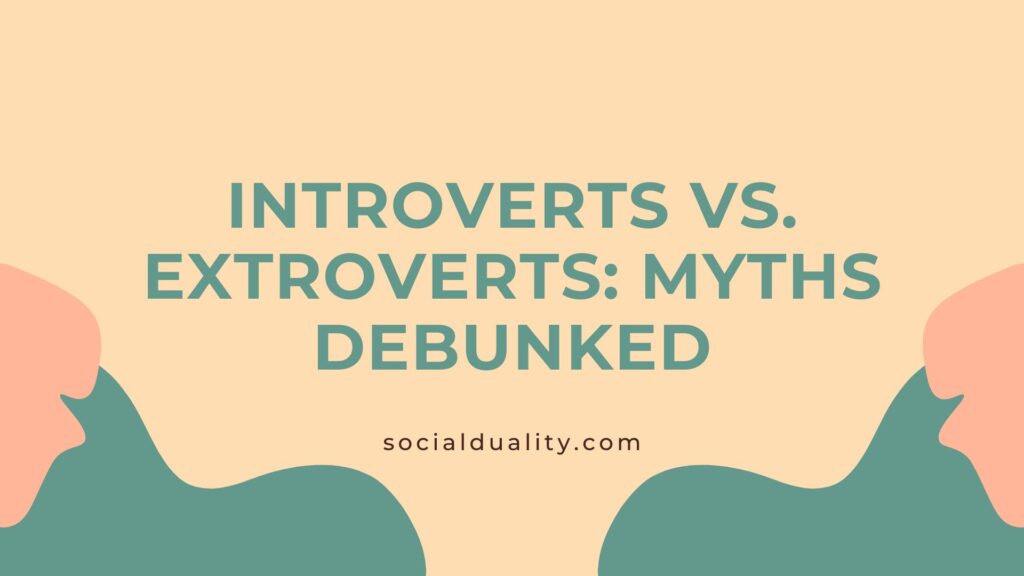Imagine you’re at a social gathering. Some people are mingling and chatting animatedly, while others are comfortably tucked away in quiet corners, engrossed in deeper, more personal conversations. These scenes, though typical, have fed into some widespread misconceptions about introverts and extroverts. This blog post aims to debunk those myths.
We’ll delve into the truth about introverts, often wrongly labeled as antisocial or risk-averse, and the myths that surround extroverts, commonly misunderstood as constant attention-seekers. We’ll also explore how these personality types interact and why it’s essential to appreciate both in our social and business teams. So, buckle up for a deep dive into the world of introverts and extroverts, as we uncover the reality behind the myths.
Key Takeaways
- Introverts are often labeled as antisocial and risk-averse, but they simply enjoy smaller, more intimate social settings and are strategic decision makers.
- Extroverts, while often seen as attention-seeking, are driven by a need for social interactions to raise their dopamine levels, but they are not always happier or more confident than introverts.
- Both introverts and extroverts have unique ways of finding happiness and fulfillment, not tied exclusively to their social preferences.
- Most people exhibit traits of both introverts and extroverts, and understanding these can lead to better relationships and environments.
- Harmful myths about either group can be debunked by understanding the spontaneous brain types, as they are found across all generations.
3 Widespread Myths about Introverts
Shattering the illusion of widely believed myths about introverts needs accurate understanding of their personality traits. The first myth is that introverts are antisocial. Contrary to this belief, they enjoy social interactions, but in more intimate and quieter settings. Another prevalent myth is that introverts lack the courage to take risks. However, the truth is that their strategic and careful nature makes them good decision makers. The final widespread falsehood is that introverts lack confidence. Remember, confidence is not a byproduct of extroversion but a result of comfort in one’s environment.
During our exploration of introvert and extrovert communication styles, we found that introverts tend to be more thoughtful and prefer deep, meaningful conversations, debunking the antisocial myth.
| Myth | Truth | Source |
|---|---|---|
| Introverts are antisocial | They prefer intimate settings | APA Journal |
| Introverts don’t take risks | They are strategic decision-makers | APA Journal |
| Introverts lack confidence | Confidence is about comfort in environment | APA Journal |
Here are some tips for understanding introverts:
- Respect their need for solitude.
- Appreciate their listening skills.
- Acknowledge their thoughtful nature.
- Understand their preference for in-depth conversations.
- Recognize their comfort in smaller gatherings.
- Value their strategic decision-making skills.
- Respect their different way of socializing.
By dispelling these myths, we can create a more accepting and understanding society for both introverts and extroverts to thrive.
Are Introverts Really Antisocial and Risk-Averse?
The common misinterpretation of introverts as antisocial or risk-averse individuals is a prevalent myth that needs debunking. In actuality, introverts possess a unique social energy threshold that gets recharged during solitary moments or in small, intimate gatherings. Their social preference doesn’t equate to antisocial behavior, but merely a different approach to socialization.
As for their perceived aversion to risks, this is another misconception rooted in their strategic, careful decision-making. Introverts aren’t scared of taking risks; they simply take time to evaluate their options thoroughly before acting. Such careful deliberation can sometimes be misread as fear or hesitation, further fueling the myth.
Introverts, therefore, are neither antisocial nor risk-averse. They just navigate social and decision-making landscapes differently, a trait that should be understood and respected.


Breaking Down 3 Common Extrovert Stereotypes
Let’s debunk three popular misconceptions about extroverts. First off, extroverts aren’t attention seekers. They thrive on social interactions due to their need for higher dopamine levels. Secondly, happiness isn’t exclusive to extroverts. Happiness depends on several factors, not just social interaction. Lastly, extrovert confidence is a common myth. Confidence is individual and isn’t determined by one’s extroverted nature.
A study found on psycnet.apa.org supports these assertions and provides a deeper understanding of the extrovert’s brain function.
| Extrovert Myths | Fact Check | Source |
|---|---|---|
| Attention Seekers | False | psycnet.apa.org |
| Always Happy | False | psycnet.apa.org |
| More Confident | False | psycnet.apa.org |
Remember, everyone is unique and labeling someone based on their extroverted nature can lead to misunderstandings.
The Truth about Extrovert Confidence and Happiness
Shattering the illusion about extroverts’ perpetual happiness and steadfast confidence is long overdue. A prevalent myth is that extroverts are constantly brimming with confidence and happiness, but this oversimplifies the complexities of human emotions and personality traits.
Here’s the reality:
- Confidence is not exclusive to extroverts. It’s rather a reflection of one’s self-assuredness and comfort in their own skin.
- Happiness is not a byproduct of extroversion. It’s subjective and influenced by numerous personal and environmental factors.
- Extroverts can experience moments of insecurity and sadness, just like anyone else.
- Extroverts may seem happier due to their outward expressiveness, but this doesn’t equate to a constant state of bliss.
- Extroverts can be introverted in certain situations and vice versa. This fluidity of personality traits is known as the introvert-extrovert spectrum.
So, let’s not box ourselves or others into rigid stereotypes. Instead, embrace the diversity of our personalities.


The Interplay of Introverts and Extroverts: Myth or Reality?
When it comes to the interaction between introverts and extroverts, reality trumps the myth. The two personality types can create a harmonious balance, contrary to popular belief. Their differences can often complement each other, fostering a dynamic and fruitful partnership. For example, an introvert’s thoughtful approach can balance an extrovert’s spontaneous brain type in decision-making processes.
The myth that introverts make poor leaders is debunked by many successful introverted leaders, showing that leadership ability isn’t confined to extroverts. Likewise, the comment that extroverts are always the center of attention is a simplification. Extroverts can also appreciate quiet moments and the company of a few close friends.
These myths and misconceptions only serve to limit our understanding and appreciation of the diverse personalities around us. By recognizing the strengths and potential of both introverts and extroverts, we can build more inclusive and effective teams. Ultimately, it’s not an introvert versus extrovert thing, but rather, a collaboration that can lead to great achievements.
Conclusion
Debunking myths about introverts and extroverts has shed light on how these personality types are not rigid categories but rather fluid traits that shape our social interactions. We discovered that introverts aren’t antisocial or fear risk, but thrive in intimate settings and are strategic decision-makers. Extroverts aren’t attention-seekers and their happiness and confidence isn’t solely tied to their social nature.
The reality is that, as humans, we all carry a blend of both introvert and extrovert traits, adapting to different social situations based on our comfort level. Understanding these nuances helps us appreciate the diverse ways in which people perceive and interact with the world. It’s not a battle of introverts versus extroverts, rather it’s about celebrating the dynamic interplay of these traits within us, paving the way for more inclusive and understanding social environments.
What are some common misconceptions about introverts?
Three widespread myths about introverts are that they are antisocial, risk-averse, and lack confidence. However, these are not accurate. Introverts do enjoy relationships and socializing, but they prefer smaller, more intimate settings. Their cautious nature means they are more deliberate in their decision-making processes, which can sometimes be misinterpreted as fear of risk-taking. As for confidence, it is not tied to how outgoing someone is but rather how comfortable they are in their chosen environments.
Is it true that introverts are antisocial and risk-averse?
No, introverts are not antisocial; they simply have a different social energy threshold. They get recharged by spending time alone or with a small group of friends. Introverts are also not inherently risk-averse. They are strategic and evaluate risks thoroughly before making decisions, which can sometimes be seen as hesitation or fear of risk-taking.
What are some common misconceptions about extroverts?
Extroverts are often seen as the life of the party, but this doesn’t mean they are always seeking attention. Their social nature is driven by a need for higher dopamine levels, which they achieve through social interactions. Another misconception is that extroverts are always happier and more confident. However, happiness depends on various factors, not just social interaction. Confidence varies individually and is not solely determined by one’s extroverted nature.
Do extroverts always exhibit more confidence and happiness?
No, extroverts may appear more confident due to their outgoing nature, but confidence is about being comfortable in one’s own skin, regardless of social preference. Happiness is also not exclusively tied to being an extrovert. Both personality types have unique ways of finding happiness and fulfillment. Extroverts thrive in social environments, while introverts find joy in solitary activities or small gatherings.
Are introverts and extroverts polar opposites?
Contrary to popular belief, introverts and extroverts are not polar opposites. Most people exhibit traits of both personality types, which allows individuals to adapt to different social situations regardless of their primary personality type. The key is understanding and appreciating the strengths and preferences of both types to foster better relationships and environments.


